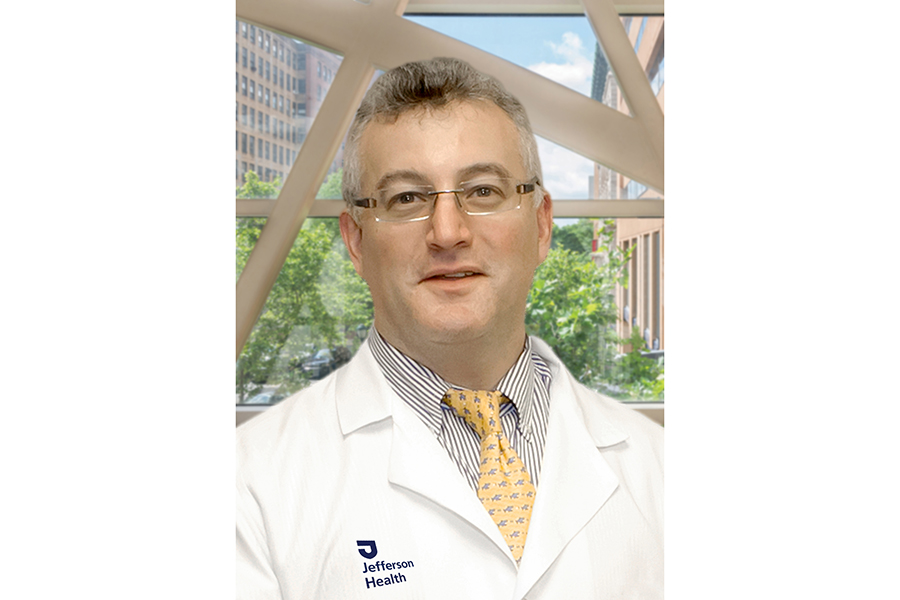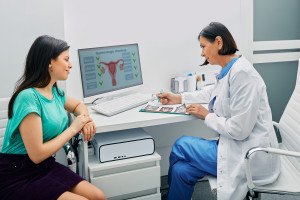Medical Guidelines Now Recommend Colon Cancer Screening Begin at a Younger Age. A Cancer Specialist Explains How to Decrease Your Risk

It’s important to understand that even commonplace health advice and guidelines are not set in stone. Recommendations from experts in health care come after carefully examining a wide range of data regarding public health. But as public health changes, so do the recommendations–and it’s critical to keep yourself in the know.
Case in point: The U.S. Preventive Services Task Force and the American Cancer Society have each lowered their recommended age for getting screened for colon cancer from 50 to 45 (and for people with risk factors such as a family history of cancer, it can be younger). It’s an important update: Colorectal cancer is the third leading cause of cancer deaths in the U.S., and getting screened on time can be critical, as colon cancer can, fortunately, be curable if caught early. In fact, thanks primarily due to screenings, rates of colorectal cancer and colorectal cancer deaths have both decreased overall in recent years.
So why the younger age recommendation? Despite good news regarding overall rates of incidence and mortality, there’s important news for those under the age of 50. Cases have actually been increasing for adults under 50, a surprising fact for a cancer often broadly associated with aging.
“It’s a good thing they lowered the screening age–younger folks don’t always think of getting screened for it,” says Mark Morginstin, DO, medical oncologist at Jefferson Health’s Sidney Kimmel Cancer Center at Jefferson Einstein Montgomery Hospital in Pennsylvania. “But you can’t ignore the numbers.”
The benefit of keeping yourself abreast of the latest health information is that there’s often a lot more that you can do to protect yourself than you might think. We spoke to Dr. Morginstin about what’s driving colorectal cancer rates, how to know when to get screened, the different options for screening, and how anyone, of any age, can be proactive about decreasing their risk.

Combatting the Causes of Cancer Early
Even before you reach the recommended age for screening, there are behavioral changes you can adopt that may lower your risk. While no one knows for sure why colorectal cancer in young people, specifically, is rising, there’s a lot of evidence pointing toward which lifestyle factors can increase the risk of colorectal cancer–and these factors are widespread in the U.S. Chief among them are poor diet, a sedentary lifestyle, and resultant obesity.
“People are more sedentary. In our diets, there are more sugary drinks, fatty foods, processed meats. These foods are bad for your health and can increase your risk of cancer, especially colorectal cancer. Those are the culprits,” Dr. Morginstin says.
Dr. Morginstin notes that research suggests that half of younger adults with colorectal cancer are overweight. The body’s struggle to process glucose when overweight, and even the negative impact on your stomach’s microbiome that comes from consuming unhealthy foods, may be some of the drivers behind that increased risk. (For more information on building a healthy gut microbiome—and its relationship to colon cancer prevention—check out this episode of the Living Well Podcast by Jefferson Health.)
In any case, the correlation is clear–keeping up a healthy diet and active lifestyle can likely help lower your colorectal cancer risk.
When to Get Your First Screening
There’s another step to take if you’re younger than 45. If someone in your family previously had colorectal cancer, that can raise your risk and affect what age you should begin screening. No matter your age, understanding your family history is important.
“If a first-degree family member has had colorectal cancer–that’s your parents or a brother or a sister who’s older–then the screening should take place ten years prior to the age when they developed the cancer, or by age 40,” Dr. Morginstin says. In addition, your own personal medical history can make that screening age recommendation even earlier. Individuals with a history of polyps, or who have an inflammatory bowel disease such as Crohn’s or ulcerative colitis, should receive their first screening eight to ten years after they first noticed their symptoms.
For individuals with a more distant relative who has had cancer, it’s still important to find out the exact nature of the disease, as it can also affect your risk. This may be trickier than many people realize–stigma around cancer or talking about health conditions in general, especially in older generations, may mean that an illness has gone overlooked.
“It’s important to talk about it because a lot of people have no idea,” Dr. Morginstin says. “You should have the conversation with a relative regarding, ‘What exactly did grandma or grandpa pass away from?’”

Mark Morginstin, DO, medical oncologist at Jefferson Health’s Sidney Kimmel Cancer Center at Jefferson Einstein Montgomery Hospital in Pennsylvania
While one great uncle with cancer does not necessarily raise your risk, if one or more of your relatives have had cancer, you may be a good candidate for genetic testing, to determine if there’s an underlying cause. That’s why it’s important to not just ask about colorectal cancers, but all cancers–a consistent history of cancers such as uterine, ovarian or pancreatic can actually be an indicator of genetic diseases such as Lynch Syndrome, which puts you at greater risk of multiple cancers, including colorectal. To find out if genetic testing is right for you, talk to your family physician, your GI doctor, or even a genetic counselor, which are increasingly available on-staff at major health systems including Jefferson Health.
If you do have a genetic condition or are otherwise at increased risk, more frequent colonoscopy screenings may be recommended. But for a patient with average risk, once you get that first colonoscopy, you won’t need another for ten years, or five years if a polyp is found.
How to Get Screened
For those worried about making it to the doctor’s office, innovations have given you new options. Stool tests are an increasingly popular, widely commercially available option in recent years. Known as Fecal Immunochemical Test (FIT-DNA) kits at Jefferson, they can provide significant insight into your risk of colorectal cancer by detecting biomarkers associated with cancer. The stool sample can be collected at home and mailed to a lab, so there’s no need for a doctor’s visit.
For those unable to use a FIT-DNA kit or a colonoscopy, a sigmoidoscopy, which examines the lower colon, or a CT colonography, which scans the colon using low-dose radiation, are viable back-up options. These options are critical because some amount of screening is far better than no screening at all. But none of these alternatives are as effective as a true colonoscopy, for several reasons.
“They’re effective, but it’s not the gold standard. That’s always going to be a colonoscopy,” Dr. Morginstin says. According to Dr. Morginstin, stool tests can result in false positives and negatives, which means that anyone who is high risk, in particular, should get a colonoscopy. Colonoscopies can also provide more information–the physician will be able to determine the polyp’s physical location in the body, which can provide insight as to your genetic risk, as well as the type of cancer that may develop. Finally, colonoscopies allow the doctor to remove the polyp immediately. The polyp gets sent to pathology, and depending on its composition, your screening recommendation could change.
In summary, the benefits outweigh the challenges, according to Dr. Morginstin. “If you can, you should get the gold standard–a colonoscopy–at least once, then go from there,” he says.
And while the doctor’s visit is time-consuming, and the prep (twenty-four hours of fasting) can be a little inconvenient, the risk of developing advanced colorectal cancer makes it worth it.
“Cancer takes time to develop. Usually someone is ignoring their symptoms for a long time,” Dr. Morginstin says. “But if you don’t get screened, and the tumor grows or it advances to stage three, then you might end up needing surgery, radiation (for rectal cancer), chemotherapy, or even all three modalities.”
If colorectal cancer is caught early through screening, it makes a world of difference. Depending on the stage of the cancer, surgery alone may be curative. All cancers, including colon cancer, are evaluated thoroughly in a multidisciplinary tumor board at Jefferson Einstein Montgomery Hospital to make official management decisions. Surgical oncology, medical oncology, pathology, radiology, radiation oncology and genetics are present at these tumor boards to discuss each patient with cancer.
“Colon cancer is most curable if you catch it at the earlier stages,” Dr. Morginstin says. “If you catch it early, you may be able to quickly return to your everyday life.”
This is a paid partnership between Jefferson Health and Philadelphia Magazine